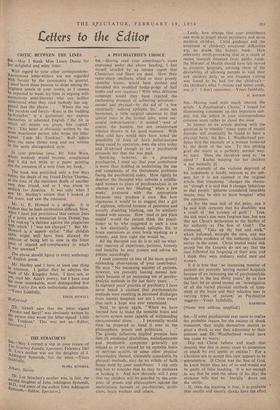SIR,—Having read with much interest the article A Psychiatrist's Choice,'
I hoped for illuminating comments on this important sub- ject, -but the letters in your correspondence columns seem rather to cloud the issue.
In answer to an article dealing with the question as to whether many types of mental disorder will eventually be found to have a physical basis,' the Rev. L. Weatherhead pro- duces first the example of a woman bereaved by the death of her son. To this abiding grief she reacts in a perfectly normal way: by tears. 'Does she therefore need to ' be cured"? Rachel weeping for her children is not mentally ill.
The example 'of the violinist deprived of his instsument is hardly relevant to the sub- ject, for it is not claimed in the original article that leucotomy changes the charac- ter' though it is said that it changes behaviour so that people hitherto considered incurably insane, may be able to leave hospital' after the operation.
As for the man sick of the- palsy, can it be said with certainty that his disability was a result of the tyranny of guilt' ? True, the sick man's sins were forgiven him, but was this not Christ's declaration to the Scribes of his authdrity as The Son of God ? The command, " Take up thy bed and walk," which followed, wrought the cure, and was the visible evidence of the authority claimed earlier in the scene. Christ healed many sick people but the Gospels do not say that the cure followed his forgiving of their sins; and I think they were ordinary sinful men' and women.
If it is true that no increasing number of patients are provenly leaving mental hospitals because of an increasing use of psychoanalytic methods in the last thirty years,' let us face the fact; let us spend money on investigation of all the varied physical methods of treat- ment of the brain and their selective uses in varying types of patient,' as Psychiatrist suggests.—Yours faithfully,
KARSHISH
[Name and address supplied.]


































 Previous page
Previous page